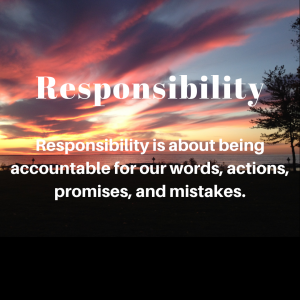
Description
Responsibility is the willingness to be accountable for our choices. Others can depend on us to do what we say we will do and to give our best effort. We take on what is ours to do with commitment and reliability. It is important to discern what responsibility belongs to us, and what belongs to others. Taking on another’s spiritual work deprives us both. When we make mistakes, we have the courage to change for the better. We make amends instead of excuses. We have the ability to respond ably.
Quote
“My life is an influence on every life mine touches. Whether I realize it or not, I am responsible and accountable for that influence.”
— Ron Baron
“The moment you take responsibility for everything in your life is the moment you can change anything in your life.” — Hal Elrod
“Mistakes are always forgivable if one has the courage to admit them.” – Bruce Lee
The Practice of Responsibility
- I am accountable for what I do.
- Others can rely on me.
- I keep my agreements.
- I give excellence to all that I do.
- I focus on my part, not someone else’s.
- I make amends for my mistakes.
Definitions and practices of virtue are used with permission from the Virtues Project™.
Responsibility is the quality of being accountable for one’s actions, decisions, and obligations. It involves recognizing and accepting the consequences of one’s choices and actions and owning them.
Being responsible is important because it leads to a sense of personal satisfaction and fulfillment. When we take responsibility for our lives, we control our destiny and have the power to shape our future. We become more reliable and trustworthy, which can enhance our personal and professional relationships.
Responsibility also contributes to the stability and success of society as a whole. When individuals take responsibility for their actions and obligations, they fulfill their roles as community members and contribute to the common good. Conversely, neglecting responsibility can negatively affect individuals and society, such as loss of trust, respect, and opportunities.
In addition, being responsible helps to build self-discipline, time management skills, and a strong work ethic. It also cultivates a sense of integrity and honor as we become more aware of the impact of our actions on ourselves and others.
In Family Life
In a family context, the virtue of responsibility is a cornerstone that fosters harmony and mutual support. It is exemplified through actions demonstrating a commitment to one’s duties and obligations within the family unit. Responsibility can be seen in parents ensuring the well-being and nurturing of their children, providing them with love, guidance, and a safe environment to grow in.
Similarly, children can display responsibility by respecting their parents, contributing to household chores, and taking their education seriously. In essence, responsibility in a family is an unspoken pact, a shared understanding that each member plays a crucial role in maintaining the family’s stability and happiness. In these small daily acts of consideration and care, the true essence of familial responsibility shines, creating a loving and supportive environment for all.
Balancing Virtues:
-
-
- Humility: Humility tempers an overdeveloped sense of responsibility by reminding individuals that it’s okay to ask for help and to acknowledge limitations. It fosters a willingness to collaborate and share responsibilities, promoting teamwork and collective success.
- Discernment: Discernment helps individuals determine which responsibilities are theirs to bear and which should be entrusted to others. It prevents the overextension of one’s capacities and ensures a balanced distribution of tasks within the personal and professional realms.
- Courage: Courage complements responsibility by empowering individuals to admit mistakes, make amends, and embrace change. It emboldens them to confront challenges, learn from setbacks, and continuously strive for improvement without succumbing to fear or avoidance.
-
Responsibility is pivotal in virtues, guiding us to honor our commitments, acknowledge our faults, and cultivate integrity in all our endeavors.

